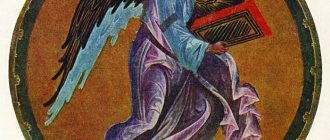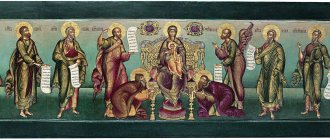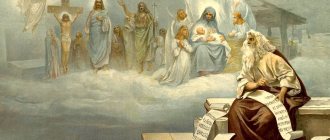Dostoevsky and the Church
It is hardly possible to name another writer whose fiction so categorically and sharply invades living life, whose seemingly incredible prophecies come true in reality many decades later with ironclad and detailed thoroughness. The questions raised with great force in literature by Dostoevsky are questions of spirit and conscience - that is, the main questions for every sincere human heart. Dostoevsky's heroes always stand on the brink of the most important choice - between truth and lies, light and darkness, good and evil.
Dostoevsky is a realist, but the only reality that truly worries him is spiritual reality, the reality of the inner life of a human being that is not visible to carnal eyes; That’s why to us, people who know more about spiritual life from hearsay, Dostoevsky often seems like a mystic and even a science fiction writer. But everything visible is temporary, everything invisible is eternal (2 Cor. 4:18), Dostoevsky could repeat after the Apostle and the holy fathers of the Orthodox Church.
It is obvious to any researcher of artistic creativity that the scale of an artist is determined primarily by the scale of the issues and themes that concern him. Dostoevsky never took on non-main topics. More precisely, under his pen, any topic of ordinary everyday life became the main one. In each particular case, he, like no one else, was able to see and reveal the general meaning of what was happening, the vicissitudes of the main battle of the Russian and global historical process - the battle between faith and apostasy, Christ and the Belial.
For the Russian, Russian heart, Dostoevsky is especially close. After all, it was precisely the theme of Russianness, Russianness, the theme of Russia that was the cross-cutting theme of his work, and Russian pain was his eternal pain. At the same time, Dostoevsky was never, even to the slightest degree, an ethnographic writer praising Russian sarafans and round dances, nor was he a “populist” writer extolling folk life and customs at all costs. On the contrary, the writer approached the people, their spiritual reality strictly, without making allowances, with the same moral principles that he followed in his personal life.
* * *
This scale of Dostoevsky’s creativity predetermined the enormous and undeniable fame of the Russian writer. In more than a hundred years since his death, hundreds of books and thousands of articles have been written about him. They will, of course, continue to write about him in the future, until human society, at least in its smallest part, manages to preserve its human appearance.
And yet, despite the enormous, almost immense amount of critical literature about Dostoevsky, there is a topic that is still very sparingly, indistinctly and contradictorily covered by researchers of his work. This topic is “Dostoevsky and Orthodoxy” or, more specifically and specifically, “Dostoevsky and the Church”. Yes, in the relationship between Dostoevsky the artist and the Orthodox Church there is not so much contradiction and incompatibility, but there is reticence and ambiguity of some issues.
This is manifested primarily in private assessments of his personality and creativity by people well-known in church history. Indeed, on the one hand, we hear sincere words coming from the depths of the heart of Orthodox Russian priests and bishops, the writer’s contemporaries, who served a memorial service “for our great writer and pious Christian Fyodor Mikhailovich Dostoevsky,” on the other hand, we read in the book of the Orthodox thinker Konstantin Leontyev “Our New Christians” accuses Dostoevsky of the “pink Christianity” he invented, of the implausibility of the image of Russian Orthodox monasticism drawn by the writer in his last, final novel, “The Brothers Karamazov”.
In the 20th century, Leontyev’s opinion was used to being mentioned as curious – and nothing more. Even such a well-known Orthodox critic of Dostoevsky’s work as Metropolitan Anthony (Khrapovitsky), mentioning Leontiev’s assessment, explained it by “the reluctance to understand our great writer by the extreme right-wing elements of our literature.” However, today the definition of “right” for the true Orthodox consciousness is not at all a derogatory assessment. And the accusation of “unwillingness to understand” requires at least reasonable evidence. Therefore, such a state of reticence and vagueness in such a serious issue as “Dostoevsky and the Church” is abnormal and unacceptable today.
Without pretending, of course, to have a final solution to an issue of this magnitude, we will try to outline the guidelines that are necessary to evaluate the work of Fyodor Mikhailovich Dostoevsky from the Orthodox Church point of view.
I. Fate
For a believer, artistic creativity, no matter how outstanding it may be, can never have an absolute, self-sufficient value. It is not the artistic images of the writer that go after his death and private trial at the ordeal to heaven or the abyss of hell, but he himself, his personality, face, his soul. Therefore, any attempt to understand and recognize a writer presupposes, first of all, an attempt to understand and recognize the person in him, to find out his fate.
Dostoevsky was born in 1821 in Moscow, in the family of a doctor, in the apartment of the Mariinsky Hospital for the Poor, better known as Bozhedomki.
The Dostoevsky family, known since the 16th century, included landowners and monks, warriors and bishops. The writer's grandfather was a priest in the Podolsk province.
Such qualities of little Fedya as spiritual vulnerability, heartfelt sympathy for the suffering of others, ardor of character, craving for the miraculous and religious mood attracted the attention of those around him. In the life that the Dostoevskys lived, there was no shortage of suffering, which means that constant self-restraint was required for the sake of others. Here is just one typical case. When the fortress village of the Dostoevskys, bought by the writer’s father after assigning the family hereditary nobility, burned down, the Dostoevskys donated all their money to help the fire victims. The future writer grew up on such examples. Already his first story, which brought him short-lived but loud literary fame, was called “Poor People” and flowed most organically from the experiences of childhood and youth.
From his earliest youth, Dostoevsky's main book was the Gospel. A short friendship with Belinsky did not shake the writer’s main love - for Christ. This is how Dostoevsky later recalled about that time in “The Diary of a Writer”: “That evening we were not alone, one of Belinsky’s friends was present, whom he greatly respected and obeyed in many respects; There was also one young, aspiring writer, who later earned fame in literature.
“It’s even touching for me to look at him,” Belinsky suddenly interrupted his furious exclamations, turning to his friend and pointing at me, “every time I remember Christ like that, his whole face changes, as if he wants to cry... Yes, believe me.” But, you naive person,” he attacked me again, “believe me that your Christ, if born in our time, would have been the most inconspicuous and ordinary person, and would have faded into oblivion given the current science and the current dynamics of humanity.
- Well, no! – Belinsky’s friend picked up. (I remember we were sitting, and he was pacing back and forth around the room.) - Well, no; if Christ appeared now, He would join the movement and become its head... “Well, yes, well, yes,” Belinsky suddenly agreed with surprising haste. “He would have joined the socialists and followed them.”
These engines of humanity, to which Christ was destined to join, were then all French ... "
Participation in Petrashevsky’s circle was, of course, the most left-radical and revolutionary period in Dostoevsky’s biography, but it is amazing that, even as a conspirator, the writer did not for a moment recoil from his main Ideal. Before the execution, when the final preparations for it were underway, Dostoevsky, according to the memoirs of Prince F. Lvov, approached Speshnev, his Petrashevsky accomplice, and said: “We will be together with Christ!” “A handful of ashes,” Speshnev answered.
In this short dialogue, both phrases are remarkable and characteristic. Dostoevsky believed that by participating in a secret society with the goal of liberating the peasants, he was doing Christ's work. Speshnev, perhaps, against his will, said words that were almost prophetic for the conspirators: if the rebels had died at that moment, without repenting of their crime, they would certainly have become only a “handful of ashes” for Christ.
But their life was extended. The years of hard labor became for the writer years of a great spiritual revolution: having learned, accepted and truly deeply and sincerely loved the Russian people, he learned and accepted the almost thousand-year-old faith of his people - Orthodoxy.
At the same time, hard labor did not suppress, but, on the contrary, developed in him his main qualities - compassion, mercy, love.
“Fyodor Mikhailovich’s condescension towards people was as if out of this world,” his friend Baron A. Wrangel recalled about the years of Dostoevsky’s Siberian exile after hard labor. “Everything downtrodden by fate, the unfortunate, the sick and the poor found special sympathy in him. His out-of-the-ordinary kindness is known to everyone who knew him closely... He is a very pious man, sickly, but with an iron will...”
However, during this period Dostoevsky’s complete churching had not yet occurred. According to the memoirs of the same Wrangel, Dostoevsky “was rather devout, but he rarely went to church and did not like priests, especially Siberian ones. He spoke about Christ with delight.”
Marriage of Dostoevsky to M.D. Isaeva, which happened in the winter of 1857 (he was still an exile at that time), is based largely on the same human premises: compassion, the desire to save, to sacrifice oneself. True, to sacrifice himself “for the sake of the happiness of his beloved woman,” who, in essence, did not love him. This maximalism of will in achieving a rather fantastic goal is also one of the characteristic features of Dostoevsky’s personality. This marriage, which lasted seven years, did not bring peace and happiness, but for the rest of his life Dostoevsky received a new heavy burden in the form of his stepson Pavel - a fop, a quitter and a liar, who demanded only one thing from his stepfather - money.
By the way, until the end of his life, Fyodor Mikhailovich carried another difficult financial burden: he actually supported the large family of Mikhail Mikhailovich Dostoevsky, his older brother who died early. It should be noted that both stepson Pavel and his brother’s family took these sacrifices of Dostoevsky, who already had his own large family and was constantly living in poverty, for granted, as his duty to them.
Like every person, Dostoevsky was overwhelmed by various passions in life: jealousy, for example, or a passion for roulette during his life abroad, but for many decades, starting in Siberia, he suffered from a serious physical illness - epilepsy.
Dostoevsky died a Christian death. Here's how the writer's wife Anna Grigorievna Dostoevskaya remembers it:
“When the doctor began to examine and tap the patient’s chest, he began bleeding again, and this time so severe that Fyodor Mikhailovich lost consciousness. When he was brought to his senses, his first words addressed to me were:
- Anya, please, invite a priest immediately, I want to confess and receive communion!
Although the doctor began to assure that there was no particular danger, in order to reassure the patient, I fulfilled his wish. We lived near the Vladimir Church, and the invited priest, Fr. Megorsky was already with us in half an hour. Fyodor Mikhailovich calmly and good-naturedly met the priest, confessed for a long time and took communion. When the priest left and the children and I entered the office to congratulate Fyodor Mikhailovich on receiving the Holy Mysteries, he blessed me and the children, asked them to live in peace, love each other, love and take care of me. Having sent the children away, Fyodor Mikhailovich thanked me for the happiness that I had given him, and asked me to forgive me if he had upset me in any way...
...Then he told me the words that a rare husband could say to his wife after fourteen years of marriage:
“Remember, Anya, I have always loved you dearly and have never betrayed you, even mentally...”
Dostoevsky's funeral resulted in an amazing demonstration of Christian feeling on the part of seemingly unbelieving youth. Thousands of people who saw him off sang: “Holy God, Holy Mighty, Holy Immortal, have mercy on us!” Many heartfelt speeches were made at Dostoevsky’s funeral and memorial services for him. Here is one of these words spoken by priest I. Petropavlovsky:
“Who is Fyodor Mikhailovich? Not a titled person, not a noble state person, but just a person and a Christian. Christian! This is the solution to the mystery of his spirit.
We highly honor him. How did he acquire this respect, this honor? Not by ascending to the upper spheres of state life, but by descending to the lower strata of people's life, serving humanity. This is a poor and selfless worker who has worked a lot for the good of humanity with the talents entrusted to him by God; he is a deeply believing Christian, a man of the Cross of Christ... The whole path of his life was strewn with thorns. The cup of life's sorrows and adversities was drained to the dregs; but she did not upset his heart and only kindled in him the fire of holy love for his people, for all humanity. And he was a true son of his people, a friend of all mankind.
He revealed to us our national life in its lowest, most outcast layers, and here, along with terrible spiritual ulcers, he found and showed us in the human soul that brilliant spark by which we are all akin to our Creator, the Father of lights...
The rich content of his spirit was not easily acquired by him: it was suffered by him, came out of the crucible of painful sensations in his heart. We don’t know whether it’s high, or whether it’s close, we don’t prejudge, but, undoubtedly, he is the likeness of a righteous man.”
The death of Dostoevsky was truly a “painless, shameless, peaceful” death - the kind of death that the Church asks in her prayers to the Lord for all her faithful children.
To be continued
Legend 9. Dostoevsky was sentenced to death, but he was pardoned on the scaffold
Verdict: It's true.
Execution ceremony on Semenovsky parade ground. Drawing by Boris Pokrovsky. 1849 Runiverse
Dostoevsky was sentenced to death for participating in the Petrashevsky circle. The head of this association, Mikhail Butashevich-Petrashevsky, was accused of “planning to overthrow the state structure.” There were people of different political views in the circle, but many were utopian socialists. They did not plan to overthrow the government... Dostoevsky himself is that he distributed copies of Belinsky’s letter to Gogol, where the critic, as stated in the materials of the criminal case, “analyzing the situation of Russia and the people, first spoke about the Orthodox religion in indecent and daring terms, and then about legal proceedings, laws and authorities.” Dostoevsky also turned out to be guilty of not reporting a meeting where another Petrashevtsy, Nikolai Grigoriev, read his essay “A Soldier's Conversation” with recommendations on how to overthrow Tsar Petrashevtsy in the memoirs of contemporaries. Collection of materials. In 3 volumes. T. 3. Report of the Auditor General. M.-L., 1928.. As a result, Butashevich-Petrashevsky, Dostoevsky, and 19 other members of the circle were sentenced to death.
The convicts were brought to the square where they were to be shot. According to the procedure, they were led out to the pillars in threes. The imperial pardon and the decision to replace the execution with other types of punishment were already ready, but the Petrashevites were not informed about this. The authorities decided to put on a little show and act as if they were actually carrying out an execution.
Dostoevsky later recalled that he was sixth on the list. In Vladimir Khotinenko’s series “Dostoevsky” there is an inaccuracy: the writer, along with Butashevich-Petrashevsky and another member of the circle, are the first to be taken out to be shot and put a bag over their heads, as if they were the main criminals and conspirators. But in reality, Dostoevsky watched the execution from the side, simply knowing that he was next. Other convicts recalled that on that day he behaved very enthusiastically - the impressions of waiting for execution were enough for him to last his whole life. But Nikolai Grigoriev, who was actually in the top three and was waiting for shots with a bag on his head, went crazy.










